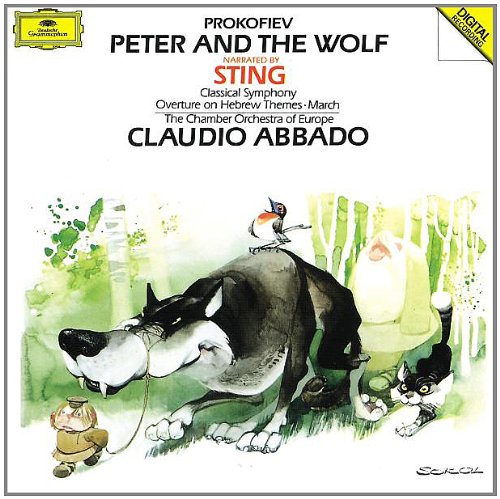Prokofiev Orchestral Works
View record and artist detailsRecord and Artist Details
Composer or Director: Sergey Prokofiev
Genre:
Orchestral
Label: DG
Magazine Review Date: 4/1991
Media Format: CD or Download
Media Runtime: 50
Mastering:
DDD
Catalogue Number: 429 396-2GH

Tracks:
| Composition | Artist Credit |
|---|---|
| Peter and the Wolf |
Sergey Prokofiev, Composer
Sting, Speaker Chamber Orchestra of Europe Claudio Abbado, Conductor Sergey Prokofiev, Composer |
| Symphony No. 1, 'Classical' |
Sergey Prokofiev, Composer
Chamber Orchestra of Europe Claudio Abbado, Conductor Sergey Prokofiev, Composer |
| Overture on Jewish Themes |
Sergey Prokofiev, Composer
Chamber Orchestra of Europe Claudio Abbado, Conductor Sergey Prokofiev, Composer |
| March |
Sergey Prokofiev, Composer
Chamber Orchestra of Europe Claudio Abbado, Conductor Sergey Prokofiev, Composer |
Composer or Director: Sergey Prokofiev
Label: DG
Magazine Review Date: 4/1991
Media Format: Cassette
Media Runtime: 0
Mastering:
DDD
Catalogue Number: 429 396-4GH

Tracks:
| Composition | Artist Credit |
|---|---|
| Peter and the Wolf |
Sergey Prokofiev, Composer
Sting, Speaker Chamber Orchestra of Europe Claudio Abbado, Conductor Sergey Prokofiev, Composer |
| Symphony No. 1, 'Classical' |
Sergey Prokofiev, Composer
Chamber Orchestra of Europe Claudio Abbado, Conductor Sergey Prokofiev, Composer |
| Overture on Jewish Themes |
Sergey Prokofiev, Composer
Chamber Orchestra of Europe Claudio Abbado, Conductor Sergey Prokofiev, Composer |
| March |
Sergey Prokofiev, Composer
Chamber Orchestra of Europe Claudio Abbado, Conductor Sergey Prokofiev, Composer |
Author: Edward Seckerson
Few amendments are made to the standard—and somewhat archaic—text (I'm not too sure about the lines: ''the wolf, in his haste and with a fortunate lack of decorum, had swallowed her alive''!), but few are necessary—the musical storytelling has rarely been better. Abbado and his splendid young COE players dust down and spruce up the old familiar motifs: Peter has such a spring in his step, the cat duly slinks, the wolf's prowling horns are craggy and mean, and timpani for once do go off like the gun shots they represent. There is urgency, there is tension, and what a difference Abbado's refined ear for dynamic nuance makes to the light and shade of the proceedings. It's the deftness of detailing that one remembers above all: the touch of shadowy pathos conveyed, for instance, in the bars following the duck's demise—a real lump-in-the-throat moment.
And when the youngsters are safely in bed, or even before, there is plenty more here to relish. Abbado's account of the Classical Symphony seems to me to make all the right choices at all the right tempos. His first movement, the right side of measured, is dapper in the best sense and marked by keen detailing in the fugal development: note the clinching flourish in the timpani line—an exciting touch which I cannot previously remember hearing. Everywhere is elegance and rhythmic grace. Abbado's strings tread air through the larghetto, the finale is indeed molto vivace with quicksilver articulation from the COE woodwinds, chortling and darting in and around the barlines. The Overture on Hebrew Themes, given here in the modest 1934 orchestration, is softer grained, less earthily acerbic, than I remember it sounding in the original scoring for clarinet, piano, and string quartet. Abbado particularly enjoys the generosity of extra strings in the lush second theme. Last but not least, the spry March in B flat is a wartime novelty which seems to scent victory: it's a little like Kije's Wedding march with a twist from a certain Three Oranges. I should like to hear it in its military band guise, but this will do nicely for now.'
Discover the world's largest classical music catalogue with Presto Music.

Gramophone Digital Club
- Digital Edition
- Digital Archive
- Reviews Database
- Full website access
From £8.75 / month
Subscribe
Gramophone Full Club
- Print Edition
- Digital Edition
- Digital Archive
- Reviews Database
- Full website access
From £11.00 / month
Subscribe
If you are a library, university or other organisation that would be interested in an institutional subscription to Gramophone please click here for further information.





